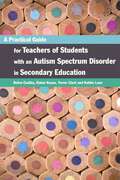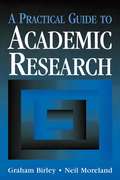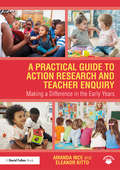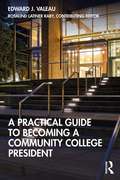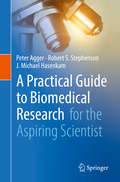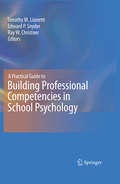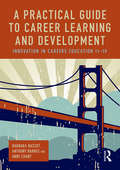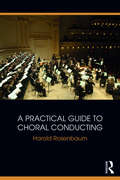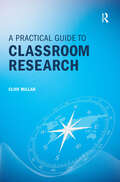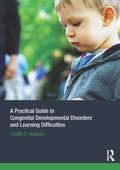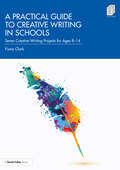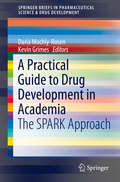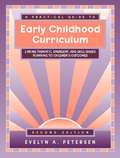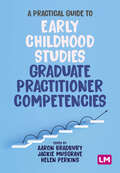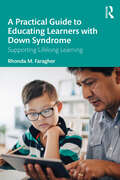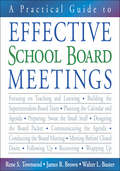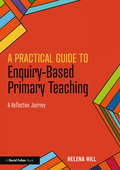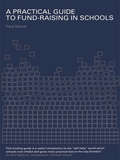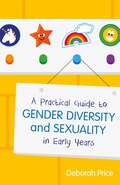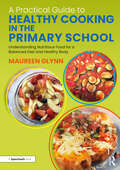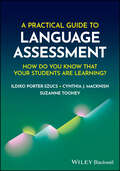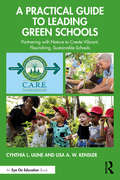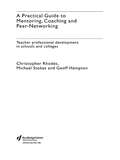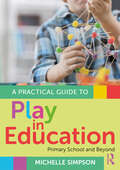- Table View
- List View
A Practical Guide for Teachers of Students with an Autism Spectrum Disorder in Secondary Education
by Kathleen Lane Elaine Keane Debra Costley Trevor ClarkStudents on the autism spectrum often face difficulties in the secondary education environment that result from a lack of awareness on the part of their teachers and peers. This guide acquaints teachers with all the information and practical tools needed to understand and support their students with autism spectrum disorders (ASD). The book presents specific, ready-to-use classroom initiatives with example worksheets, checklists and timetables to help students keep organised with their school work. It also covers general obstacles such as social situations, anxiety, mental health issues and extracurricular activities and how adults can help. Guidance about the leaving school stage and how to ensure the teen is equipped to make the best possible decisions about their future is included. Packed with useful information and examples, this book will be a lifesaving resource for teachers, and everyone else working in secondary education, who want to help their students with autism to stay focused and positive at school.
A Practical Guide to Academic Research
by Birley, Graham (Head, Education Research Unit, University of Wolverhampton) Moreland, Neil (Associate Dean, School of Education, University of Wolverhampton)Covering all aspects of research methodology, this research tool also deals with planning issues and self-management techniques needed by the researcher. It contains information on data analysis and advice for staff members needing support from their institutions to pursue research.
A Practical Guide to Action Research and Teacher Enquiry: Making a Difference in the Early Years
by Amanda Ince Eleanor KittoThis accessible guide will be an invaluable resource for early years practitioners looking to make a positive difference in their settings by using action research or teacher enquiry. Guiding readers through the practical steps, issues, and potentials of conducting research in a variety of early childhood settings, the book will increase practitioners’ confidence, enabling them to bridge the gap between recognising room for improvements and instigating necessary changes. Divided into easy-to-follow sections, A Practical Guide to Action Research and Teacher Enquiry: Making a Difference in the Early Years offers clear definitions and explanations of action research along with explanations of how it can be applied in early years settings to effectively and efficiently improve outcomes for children. Chapters outline a clear rationale for engaging in action research, highlight purposes and potentials of various approaches, and provide a helpful step-by-step discussion of the different stages of enquiry. Ten examples of practice are used to clearly illustrate the action research cycle in a variety of settings, and in relation to a range of topics and ages, thereby providing readers with a wealth of tried-and-tested ideas for application in their own settings and projects. These are supported by a range of downloadable resources which can be used as tools to support the planning, reflecting, and evaluation of practitioners’ research activities. Informative, inspiring, and highly relevant to practice, A Practical Guide to Action Research and Teacher Enquiry will support and scaffold the research activities of early years practitioners, managers, and students.
A Practical Guide to Becoming a Community College President
by Edward J. Valeau Rosalind Latiner RabyThis practical resource helps aspiring leaders demystify the challenges associated with becoming a community college president. Building on existing scholarship and research related to historical origins of the community college, this book explores the role and function of the presidency, discusses existing demographics and the importance of meeting the needs of a diverse student population, and unpacks the required competencies and leadership challenges related to becoming a community college president. Including real voices from award-winning and current presidents as well as a step-by-step approach to attaining the position, this is an important resource that speaks to the needs of today and tomorrows’ community college leaders.
A Practical Guide to Biomedical Research
by Peter Agger Robert S. Stephenson J. Michael HasenkamThis book advises and supports novice researchers in taking their first steps into the world of scientific research. Through practical tips and tricks presented in a clear, concise and step-wise manner, the book describes the entire research process from idea to publication. It also gives the reader insight into the vast opportunities a research career can provide. The books target demographic is aspiring researchers within the biomedical professions, be it medical students, young doctors, nurses, engineers, physiotherapists etc. The book will help aspirational inexperienced researchers turn their intentions into actions, providing crucial guidance for successful entry into the field of biomedical research.
A Practical Guide to Building Professional Competencies in School Psychology
by Edward P. Snyder Timothy M. Lionetti Ray W. ChristnerDesigned as a research-based yet matter-of-fact guide for beginning and future scientist-practitioners, A Practical Guide to Building Professional Competencies in School Psychology skillfully augments the reader's training, supervision, and experience by providing a framework for honing essential skills in the field. This reader-friendly, evidence-based text encourages the continuing development of expertise in communication and collaborative skills, diversity awareness, technical knowledge, and other domains critical to building and maintaining an ethical, meaningful practice. Each chapter in this must-have volume examines a core area of expertise in depth, and provides checklists (linked to competencies set out in NASP's Blueprint III) and the Development and Enhancement of Competencies Assessment Form are included to enable readers to gain a more complete understanding of their professional strengths and needs. The skill sets covered include: Developing cross-cultural competencies.Evaluating students with emotional and behavioral problems.Assessing student skills using a variety of approaches.Preventing and intervening in crisis situations.Consulting with families, colleagues, and the community.Facilitating mental health services in the school setting.A Practical Guide to Building Professional Competencies in School Psychology provides an invaluable set of professional development tools for new practitioners and graduate students in school psychology.
A Practical Guide to Career Learning and Development: Innovation in careers education 11-19
by Barbara Bassot Anthony Barnes Anne ChantA Practical Guide to Career Learning and Development is an essential guide for all those involved in careers education, either with sole responsibility or as part of a team. With a focus on career happiness, resilience and growth, this exciting book offers effective pedagogical strategies, techniques and activities to make career learning and development accessible and enjoyable, contributing to positive outcomes for all young people in the 11-19 phase of their education. With a wealth of support material such as teaching ideas, lesson plans, case studies and an illustrative student commentary, key topics covered include: Career Learning and Development needs of young people Career Learning and Development in the curriculum Practical activities for 11-14, 14-16 and 16-19 year olds Creating a positive environment for learning Teaching approaches Leadership and management Facilitating professional learning. A Practical Guide to Career Learning and Development is an invaluable resource for careers advisers and staff in schools with responsibility for leading and providing careers education as well as work-related learning, PSHE, citizenship, and pastoral programmes. It enables and supports all practitioners as they develop careers provision that better prepares young people for their future well-being and an ever-changing and unpredictable world of work.
A Practical Guide to Choral Conducting
by Harold RosenbaumRooted in the experience of a professional choral conductor, this book provides a guide to practical issues facing conductors of choral ensembles at all levels, from youth choruses to university ensembles, church and community choirs, and professional vocal groups. Paired with the discussion of practical challenges is a discussion of over fifty key works from the choral literature, with performance suggestions to aid the choral conductor in directing each piece. Dealing with often-overlooked yet vital considerations such as how to work with composers, recording, concert halls, and choral tours, A Practical Guide to Choral Conducting offers a valuable resource for both emerging choral conductors and students of choral conducting at the undergraduate and graduate levels.
A Practical Guide to Classroom Research
by Clive MillarThis concise and accessible book is a practical guide to qualitative classroom research, including extended case-studies of real research projects which serve as concrete examples of the advice provided. It gives a step by step account of how qualitative classroom research can be carried out and completed, with clear sets of guidelines for each stage and key points for consideration highlighted throughout. It can be read as a comprehensive guide to the research process, from beginning to end or as a resource to dip into to answer specific problems or queries.It is aimed at all college, university or school-based education students. In addition it is highly suitable for qualified teachers responding to the drive for greater evidence-based teaching in classrooms.
A Practical Guide to Congenital Developmental Disorders and Learning Difficulties
by Judith P. HudsonTo give children with congenital developmental conditions that manifest special learning needs and specific disabilities their best chance to succeed, early identification and appropriate interventions and support, is necessary. This text highlights what to look for when there are concerns about a child’s development. Practical and accessible, it is divided into three sections: Part 1 looks at the theory and policy context, discussing the social model of disability, the responsibility of health, social care and education services to the child and family and the role of reviews and assessment in recognising developmental disorders. Part 2 provides a reference guide to atypical developmental conditions and disorders. For each condition, aetiology, prominent theories and research, profile of features – including triggers and behaviours, diagnostic assessment procedures and appropriate interventions are given and links made to sources of further information and support. Part 3 explores practical issues how to work sensitively and effectively with children and their families, looking at the psychological implications of diagnosis, and how to plan, promote, deliver and evaluate multi-agency support. Designed to support professionals working within a multi-modal, collaborative approach to assessment and intervention processes, it is suitable for health visitors, allied health therapists, nurses, teachers and social care practitioners. It is also a useful reference for students in these areas learning about child development and includes critical reading exercises; online searching tasks; self-assessment questions; reflective activities and document analysis prompts.
A Practical Guide to Creative Writing in Schools: Seven Creative Writing Projects for Ages 8-14
by Fiona ClarkThis book contains seven tried-and-tested creative writing projects for pupils aged 8–14. Each project is delivered through a series of workshops and enables pupils to explore a literary genre or writing style, discuss themes and topics and receive constructive feedback about their writing. The projects cover topics such as identity, cultural heritage, tolerance, empathy, morality, dreams and much more. Teachers wanting to run creative writing projects will find this book easy to follow, practical and timesaving. Each project allows students to: • explore a certain literary genre or writing style in detail • be creative and have fun while learning • think about, talk about and discuss themes and topics • receive constructive feedback about their writing • pursue their own ideas • see themselves as ‘real’ writers with a ‘real’ audience • understand that writing can be enjoyable, artistic and relaxing • experience creativity to improve their wellbeing. These ready-made projects are invaluable for teachers who are looking for new and successful creative writing projects for a range of students. They will enable teachers to immediately start making a difference to their students’ confidence and writing skills, allowing them to be as creative and imaginative as possible and use creativity as a springboard for their own writing.
A Practical Guide to Drug Development in Academia: The SPARK Approach (SpringerBriefs in Pharmaceutical Science & Drug Development)
by Daria Mochly-Rosen Kevin Grimes"A lot of hard-won knowledge is laid out here in a brief but informative way. Every topic is well referenced, with citations from both the primary literature and relevant resources from the internet. " Review from Nature Chemical Biology Written by the founders of the SPARK program at Stanford University, this book is a practical guide designed for professors, students and clinicians at academic research institutions who are interested in learning more about the drug development process and how to help their discoveries become the novel drugs of the future. Often many potentially transformative basic science discoveries are not pursued because they are deemed 'too early' to attract industry interest. There are simple, relatively cost-effective things that academic researchers can do to advance their findings to the point that they can be tested in the clinic or attract more industry interest. Each chapter broadly discusses an important topic in drug development, from preclinical work in assay design through clinical trial design, regulatory issues and marketing assessments. After the practical overview provided here, the reader is encouraged to consult more detailed texts on specific topics of interest. "I would actually welcome it if this book's intended audience were broadened even more. Younger scientists starting out in the drug industry would benefit from reading it and getting some early exposure to parts of the process that they'll eventually have to understand. Journalists covering the industry (especially the small startup companies) will find this book a good reality check for many an over-hopeful press release. Even advanced investors who might want to know what really happens in the labs will find information here that might otherwise be difficult to track down in such a concentrated form. "
A Practical Guide to Early Childhood Curriculum: Linking Thematic, Emergent, and Skill-based Planning To Children's Outcomes
by Evelyn A. PetersenThis comprehensive book offers easy and practical systems to organize and integrate interest-based and skill-based curriculum ideas and to effectively plan for young children. It makes ongoing lesson plans easier to write, implement and monitor, and links lesson planning to both curriculum objectives and children's outcomes in all learning domains. The book provides comprehensive information on the setting of daily schedules, long and short range lesson planning, guidance/classroom management, and trends and priorities in the field. Diagrams, lesson plan forms, illustrations, and developmentally sequenced activity tables help teachers organize scaffolded experiences in all learning domains. The book also describes implementation that meets the diverse and changing needs of every child from the beginning to end of the year.
A Practical Guide to Early Childhood Studies Graduate Practitioner Competencies
by Jackie Musgrave Helen Perkins Aaron BradburyWhat do the Early Childhood Studies Graduate Practitioner Competencies (GPCs) mean in practice? What do they look like in settings? This book brings you case studies as examples of good practice demonstrating all of the GPCs. Each chapter covers a specific competency and includes: A visualisation of the competency Case studies to explore what each competency looks like in practice Expert commentary on each case study helping you to link theory to practice
A Practical Guide to Early Childhood Studies Graduate Practitioner Competencies
by Jackie Musgrave Helen Perkins Aaron BradburyWhat do the Early Childhood Studies Graduate Practitioner Competencies (GPCs) mean in practice? What do they look like in settings? This book brings you case studies as examples of good practice demonstrating all of the GPCs. Each chapter covers a specific competency and includes: A visualisation of the competency Case studies to explore what each competency looks like in practice Expert commentary on each case study helping you to link theory to practice
A Practical Guide to Educating Learners with Down Syndrome: Supporting Lifelong Learning
by Rhonda M. FaragherEducating learners with Down syndrome can seem daunting at first, but this practical guide for teachers and carers to using evidence-based practices shows you how. Taking a unique lifespan, curriculum-based approach, Rhonda M. Faragher promotes the understanding that people with Down syndrome are a diverse group with vast potential and varied learning needs. The book covers core learning areas such as literacy, numeracy, mathematics, science, and the Humanities, and features key points from the research literature, teaching strategies, practitioner vignettes, and personal stories from people with Down syndrome. It considers learning from birth and early intervention, through primary and secondary school, to post-secondary education and into various contexts of adulthood. Drawing on the latest research, this guide for educators is rich with strategies, as well as tips from other parents and teachers, providing an accessible and empowering resource for the delivery of quality education to benefit learners with Down syndrome.
A Practical Guide to Effective School Board Meetings
by Rene S. Townsend James R. Brown Walter L. BusterNow superintendents can turn board meetings into productive, results-getting events that help them focus on teaching and learning to achieve district goals.
A Practical Guide to Enquiry-Based Primary Teaching: A Reflective Journey
by Helena HillThis book is a guide for developing an enquiry approach in primary schools and offers practical ideas on how to empower teachers to embrace spontaneity and flexibility in their daily practice. <P><P>Designed as a thinking diary, this book provides space for the practitioner to record highs and lows in the classroom and experiences in meetings and training, ensuring it serves as a personal record of what works well but also a pertinent reminder of what can improve and what can be learnt from mistakes. A Practical Guide to Enquiry-Based Primary Teaching comprehensively covers all the steps involved in adopting this approach, including: <li>why enquiry-based learning should be at the forefront of primary settings; <li>how to develop teachers in this approach and assessing the prior learning which needs to take place beforehand; <li>settling into your role as a facilitator and recognising the stregnths and weaknesses within your enquiry team; <li>discussing and planning enquiry sessions, including clarifying objectives; <li>how to let go of a more structured approach to learning and becoming familiar with the tools in your spontaneity arsenal; <li>evaluating enquiry sessions. <P><P>Supported by research, this book is a fresh, innovative approach to enquiry-based learning and teaching and will be a valuable daily aid for both newly qualified and experienced primary teachers.
A Practical Guide to Fund-Raising in Schools
by Paul MorrisA practical guide to fund-raising for schools. Funding for schools from the customary sources has become more difficult and schools are having to raise funds through schemes involving community and commercial support. This guide explains everything that schools need to know about funding, including;*researching funds available*commercial funding*government funding*European funding initiatives*business sponsorships*how to enter local partnerships*writing a bid*making and maintaining contacts*paperwork*legalities*staffing the funding team*target-setting and monitoring*the governing body's role.
A Practical Guide to Gender Diversity and Sexuality in Early Years
by Deborah PriceAiding discussion of gender diversity and sexuality with very young children, this practical guide helps practitioners explore these themes in early years settings. Promoting and extending current good practice, the book offers advice and activities that will support children in discovering their identity and also demonstrates how to work with parents. This guide presents a background to gender theory alongside examples and case studies, showing that activities and settings can work together for children to recognise their full potential in a supportive environment. This book addresses a wide variety of topics such as staff training and team management, how to support and promote men working in childcare, transgender issues and ways practice can be challenged, to give those working with young children a great foundation for teaching about diversity. Proposing aims that early years practitioners can work towards and providing practical ideas to take directly in to the workplace, this hands-on guide sets out to create and encourage outstanding practice for all professionals teaching young children.
A Practical Guide to Healthy Cooking in the Primary School: Understanding Nutritious Food for a Balanced Diet and Healthy Body
by Maureen GlynnAs part of the national curriculum, cooking provides children with a variety of skills, from learning the science behind where food comes from to what good health is and understanding how ingredients can be turned into something tasty to eat. Packed full of practical advice, colourful recipes, and nutritional guidance, this book will provide: Guidance to teach children a range of cooking skills, using a variety of ingredients from varying sources. An understanding as to where our food comes from; seasonal and all-year-round produce; how food is grown and transported to our shops and markets. The basic skills to make food safe, nutritious, and palatable to eat. Links to STEM, PSHE, and D&T primary school curriculum subjects. Ideal for group work for any primary classroom that has access to a school kitchen, either in mainstream primary or special school settings, this book offers teachers, parents, and other practitioners a useful, photocopiable resource for delivering practical and hands-on lessons with scientific grounding. With clear, easy to read, step-by-step, written, and illustrated recipes, this book provides all of the information needed to enable children, with supervision, to prepare and make tasty food, to share with family and friends, particularly on social and special occasions.
A Practical Guide to Language Assessment: How Do You Know That Your Students Are Learning?
by Ildiko Porter-Szucs Cynthia J. Macknish Suzanne TooheyAn essential resource on effective language assessment, invaluable for a new generation of teachers and education researchers A Practical Guide to Language Assessment helps educators at every level redefine their approach to language assessment. Grounded in extensive research and aligned with the latest advances in language education, this comprehensive guide introduces foundational concepts and explores key principles in test development and item writing. Authored by a team of experienced language teacher educators, this book addresses the potential impacts of poorly designed tools and prepares teachers to make informed, effective assessment decisions. Perfect for developing test blueprints and crafting effective assessment tools, including those for young learners, A Practical Guide to Language Assessment bridges the gap between theory and practice to provide the real-world training educators need to successfully navigate the complexities of modern language assessment. Clear and accessible chapters highlight the critical role of well-designed assessments, emphasize the importance of selecting appropriate tools to accurately measure student proficiency, and discuss recent innovations and emerging needs. With practical examples and a focus on current innovations, including ‘ungrading’ and the use of AI, A Practical Guide to Language Assessment: Explains the foundational concepts of language assessment with practical examples and clear explanations Bridges theoretical principles with practical applications, enabling educators to create effective test blueprints and assessment items and tasks Provides up-to-date coverage of timely topics such as the integration of AI in assessments and the ethical and legal considerations of language testing Features a wealth of in-depth examples of how theoretical concepts can be operationalized in practice A Practical Guide to Language Assessment is an essential read for students in language education, as well as teachers, assessment managers, professional development trainers, and policymakers in language program evaluation.
A Practical Guide to Leading Green Schools: Partnering with Nature to Create Vibrant, Flourishing, Sustainable Schools
by Lisa A. Kensler Cynthia L. UlineThis practical guide for educational leaders explores how you can transform your school or district into a vibrant center of learning and socio-ecological responsibility with only three manageable actions: taking students outside, bringing nature inside, and cultivating a mindset of awareness, responsibility, and empathy. This book is rich in practical, attainable approaches and stories of real actions taken by leaders, teachers, parents, and community partners to design, lead, and manage a vibrant, flourishing, sustainable learning community. Authors Uline and Kensler take you on an inspirational journey through nine key leadership strategies for you to begin or expand your work towards whole school sustainability.
A Practical Guide to Mentoring, Coaching and Peer-networking: Teacher Professional Development in Schools and Colleges
by Christopher Rhodes Geoff Hampton Michael StokesWritten for staff in schools and colleges, this book offers the challenge and support necessary to understand, analyze and adopt coaching, mentoring and peer-networking mechanisms as an essential part of the development of professional learning within an organisation. Drawing on the new national strategy for professional development, it emphasises the importance of learning with and from other colleagues, helping your organisation to become a professional learning community and supporting the drive to raise standards and attainment. Organised into nine distinct but interrelated chapters, this is an invaluable sourcebook of practical information for in-service training. It contains a range of stimulating activities which engage the reader and encourages reflection on: * the nature and importance of professional development in schools and colleges* the potential benefits and difficulties associated with coaching, mentoring and peer-networking* factors essential to the successful establishment and management of coaching and mentoring programmes* team leadership and leadership coaching* the role of the coach, mentor and networker with respect to the creation of professional learning communities.
A Practical Guide to Play in Education: Primary School and Beyond
by Michelle SimpsonThe benefits of play for children’s learning are well-documented and well-researched. The evidence for its positive impact on brain development, social interactions, emotional wellbeing, and motor skills is widespread. So, why should this practice stop after the early years?A Practical Guide to Play in Education encourages teachers to reflect on their practice and consider how a play-based approach may enhance their teaching. It provides realistic, accessible ideas and resources to incorporate into practice while giving evidence to back up this approach. Divided into three clear sections, readers are guided through: An introduction to play in education, including theory, benefits, and potential challenges. Putting it into practice, such as setting up the classroom, resources for play, and adopting a playful ethos in a realistic and accessible way. Lesson plans in a variety of subjects, spanning from numeracy, to literacy, to health and wellbeing. This unique and practical book highlights the importance of play in helping children develop skills to support their future and demonstrates how this approach can be seamlessly integrated into teaching styles across primary and early secondary.
